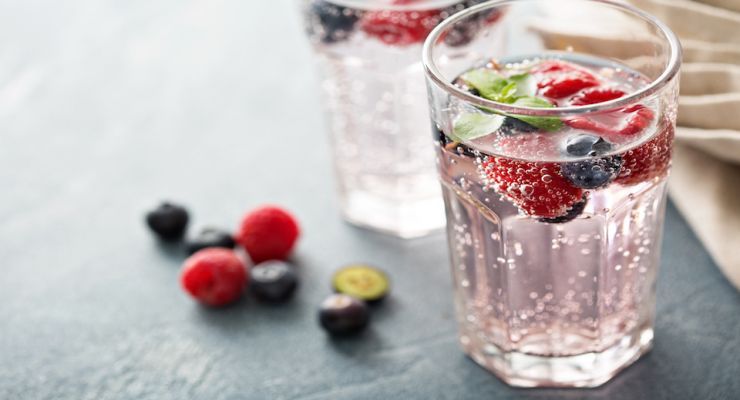“Drink more water” is practically always at the top of the list for anyone pursuing a healthier lifestyle. But many people don’t enjoy drinking plain water, so we’re always looking for tricks to make the hydration habit easier to keep up.
We’re told to avoid sugary sodas like the plague, and keep juices to a minimum. For those who just can’t drink regular old H2O, a common alternative is sparkling water — and with more trendy brands touting calorie-free, naturally flavored options cropping up weekly, more and more people are flocking to this bubbly beverage as their go-to.
But is sparkling water as hydrating and healthy as you think it is? Or is it actually just as full of health risks as those forbidden fountain drinks?
It turns out there are (at least) five significant downsides to the regular consumption of sparkling water, which could lead to damaged teeth, weight gain and more.
Sparkling Water May Erode Teeth Enamel
A common concern with bubbly drinks is the possible dental damage. Sparkling water contains a low level of acid called carbonic acid, which results from the carbon dioxide gas forcibly pumped in when the bubbles are added. While acidic drinks certainly do erode the enamel on the surface of the teeth, it remains to be seen whether pure sparkling water contains enough acid to cause a problem.
According to a study from the School of Dentistry in Birmingham, UK, drinking sparkling beverages regularly over the long term can amount to degraded enamel. This is especially true when citrus flavors are added, and the pH is even lower (more acidic) due to the citric acid. However, the effect is only slightly more than regular water and is still about 100 times less damaging than soda. Also, the mineral content of naturally-sourced sparkling water can actually counteract any erosion.
In the end, if you stick to sparkling mineral water, rather than just soda water, it’s pretty safe for your teeth.
Natural Flavors in Sparkling Water May Be Unhealthy
Plain sparkling water is safe enough, but what about flavored varieties? Certainly, it should be highlighted that tonic water is not the same as flavored sparkling water. Tonic water is high in both sugar and sodium and should be considered a soda rather than a healthy hydration alternative.
But then there are all the new options advertised as flavored water, with natural flavoring. People tend to respond positively to the word ‘natural,’ although the FDA has not defined the term ‘natural flavoring.’ Therefore it can apply to anything that came from a plant or animal, even if it has been extensively processed via heat, extraction methods or enzymes. In addition, the natural flavoring could contain other substances, like preservatives, solvents, GMOs, or hidden animal ingredients for those who don’t wish to consume those foods.
Even though natural flavors come from an organic source, they may not be any safer or healthier than any other additive.
Sparkling Water alters gut Bacteria
While plain sparkling water with added natural flavoring is one thing, many sparkling water or seltzer products also contain added sweetening agents. Though these drinks are labeled as ‘zero-calorie’ or ‘sugar-free,’ that doesn’t mean that the substances used to make the drink taste sweet are completely harmless. In fact, many artificial sweeteners, such as aspartame and sucralose, are known to affect important bacteria in the gut negatively. These are the ‘good bugs’ that allow us to produce enzymes, digest food, maintain immunity, and more. If you’re going to consume a bubbly drink, check the ingredients and go for those without any sweetening agents added.
On the other hand, there also seem to be positive digestive effects, with this study finding that elderly patients found relief from constipation after drinking carbonated water as compared with tap water.
Sparkling Water May Discourage Water Drinking
While research indicates that, glass for glass, sparkling water is just as hydrating as regular water, what if the bubbles actually subconsciously reduce the amount of water you’re drinking, and therefore undermine your best efforts to be more hydrated?
This study published in the International Journal of Sport Nutrition had 52 adults drink water samples with different levels of carbonation after exercising for 30 minutes. Those given the samples with more bubbles unknowingly completed less voluntary water consumption.
Hunger Hormones Spike After Drinking Sparkling Water
Perhaps the most significant concern about sparkling water is the potential for weight gain or even the onset of obesity. A 2017 study found that rats given carbonated beverages over a 1-year period gained weight faster, and accumulated more fat in their livers. This was thought to be due to a spike in the hunger hormone ghrelin, which causes more appetite for food and greater consumption of calories.
A parallel study done on human men also found that ghrelin levels rose following a carbonated drink versus regular tap water. The result was due to the carbon dioxide alone, in the absence of any other additives such as sweeteners or flavoring.
If maintaining a healthy weight is important to you, avoiding carbonated beverages, on the whole, is the best way to go. Make sparkling water an occasional treat rather than a constant go-to drink, and reach for regular old water instead.
And when you do want to enjoy a glass of bubbles, choose naturally-sourced mineral water, rather than just soda water with carbonation forced in. Add excitement with fresh fruit like lemon or strawberries, or even a little cucumber and mint. Although it takes a few extra minutes, making healthy sparkling water yourself ensures you won’t end up with any of the unwanted negative effects of those temptingly convenient commercial products.
-Susan Patterson

